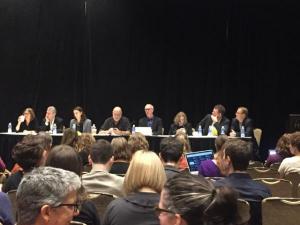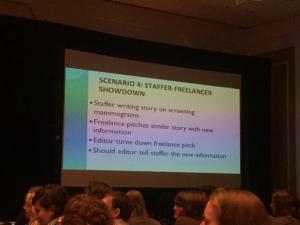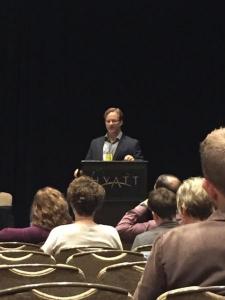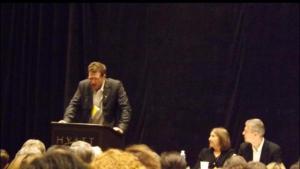By Sydney Devine
Recognizing a red flag and following your gut when ethics is in question leaves a lot of science writers questioning what is or is not actually acceptable.
Debates and anecdotes were encouraged during the session “Ethics in Today’s science writing landscape: A community conversation.” This plenary session kicked off the first of 17 sessions for the day, and more than 600 attendees showed up to watch two long-time freelance journalists square off.Mark Schrope and Erik Vance stood before the crowd to argue what exactly affects a person’s ability to be an ethical journalist and what the acceptable decisions are when we are faced with tough, red flag situations.
Both freelance journalists, Schrope and Vance come from very different scopes of interest; however, both journalists have at some point veered from straight journalism and run into some tight situations.
Schrope began the debate by describing a scenario he ran into while working, when he had a conflict of interest with an organization — he was working for the organization and was also writing for them as a freelance journalist. Clearly Schrope was in a compromising situation. He readily admitted he made the best decision he knew to do in such a situation. But Vance pointed out that it’s not about whether or not you can write a good piece, it’s realizing that you are compromised and knowing when not to do it.There are a lot of grey areas in ethical situations, such as Schrope’s, and journalists or other science writers have to keep in mind that their job is to report on science, not promote. In the end, Schrope said he didn’t claim to have the perfect solution to all of these things, but there are ways to manage them.
Unfortunately, there seem to be endless scenarios where acceptability comes into debate. After hearing from Schrope and Vance about personal circumstances where ethics was an issue, panelists joined in the conversation to help attendees talk through other tough choices.
Before presenting examples to let the audience decide, panelists Jamie Shreeve and Ellen Ruppel Shell talked about their own run-ins with these issues, explaining that there isn’t just a simple “yes” or “no” answer for most of them, and it often comes down to trusting yourself to know the right thing to do.To let attendees get a feel for just how tough these questions of ethics really can be, panelists presented a number of examples of situations — having the attendees anonymously vote in a poll on what they think is acceptable.
These questions ranged from making corrections on already published stories, attributing ideas, issuing press releases, and even taking short cuts. The answer “I have no idea” was always available because in real life we, most times, don’t actually know what to do. As mentioned, ethics has a lot of grey area, and, as writers, we are constantly faced with tough choices.
The main takeaway from these questions and debates seemed to be that you have to trust your gut to know when something is acceptable or isn’t when faced with these situations.Other panelists involved in this debate were Alexis Sobel Fitts, James Marcus, Lee Siegel and Pam Weintraub.







